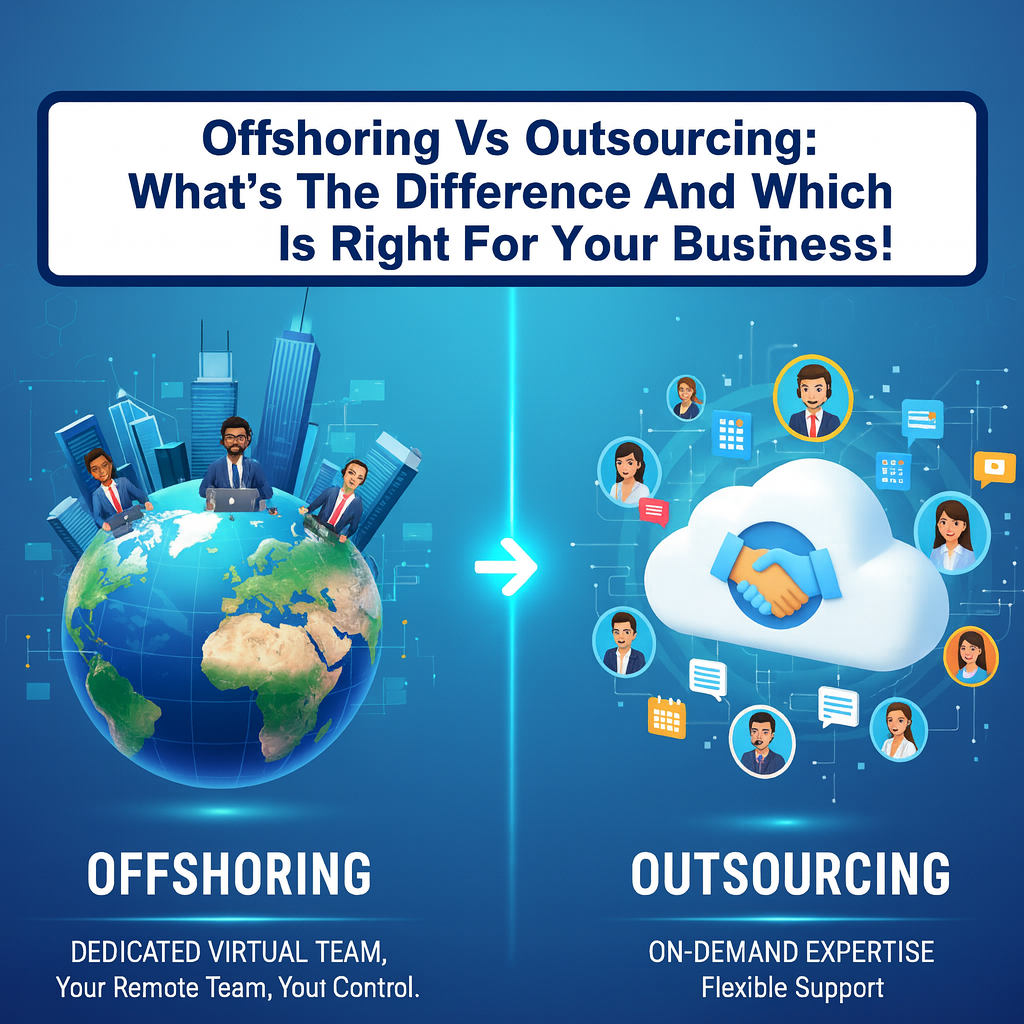Many business owners struggle to choose between outsourcing and offshoring for better cost savings and efficiency. Business process outsourcing (BPO) and offshore outsourcing are now common in customer support, IT services, and digital marketing.
This post will explain the key differences between the two options and help you pick the best fit for your business strategy and budget. Find out how the right choice can improve your business processes.
Key Takeaways
- Outsourcing means hiring outside experts or companies for tasks like customer support, IT services, or bookkeeping. Offshoring is moving these tasks to another country, often for lower labor costs and access to global talent.
- Outsourcing can happen locally or globally, but offshoring always involves a different country, such as the Philippines or India. Many U.S. companies choose these countries for their skilled workers and good English skills.
- Both options help businesses cut costs and improve efficiency. Outsourcing gives fast access to skills for non-core jobs, while offshoring offers more control over remote teams and can keep operations running 24/7 due to time zone differences.
- Risks include communication and quality control issues for both models. Offshoring also brings legal, cultural, and compliance challenges from working in other countries.
- To decide between outsourcing and offshoring, business owners must review their needs, check the expected savings, and think about long-term goals. The best choice depends on your team, budget, and growth plans.
What is Outsourcing?
Moving from the introduction, let’s focus on outsourcing. Outsourcing means contracting out certain business functions to outside experts or third-party providers. Companies often use outsourcing services for non-core tasks like customer support, technical support, bookkeeping, recruitment process outsourcing, or digital marketing.
Business process outsourcing (BPO) helps firms save costs and reach skilled labor pools across the world. Many startups rely on independent contractors for IT services such as software development or call center operations instead of hiring inhouse teams.
Small and midsize businesses also gain flexibility by using outsourced services for remote work or specific projects.
Outsourcing allows businesses to access global talent while keeping expenses under control.
This strategy can improve operational efficiency by allowing internal staff to focus on core business strategies and innovation. Quality assurance stays high when a company chooses experienced BPO companies with strong standards for communication and data security.
What is Offshoring?
Offshoring means moving part of your business operations to another country. Many companies set up remote teams in developing countries like the Philippines or India to cut labor costs and tap into global talent.
These offshore teams can handle customer support, software development, IT services, and even bookkeeping, allowing you to delegate effectively. Offshoring lets you keep full control over your daily processes while saving money through lower salaries and cheaper office space.
Businesses choose offshoring to boost operational efficiency and scale up quickly without raising local costs, but they must also consider the disadvantages of offshoring. Time zone differences can help your company stay open longer or offer 24/7 customer service outsourcing.
English proficiency is a key factor for many U.S.-based businesses choosing places like the Philippines for BPO work. Offshoring also helps improve supply chain flexibility because tasks are spread across different locations worldwide.
This approach supports remote working trends and gives access to specialized skills that may be hard to find at home.
Key Differences Between Outsourcing and Offshoring
Outsourcing means hiring another company to do work for you, while offshoring is moving work to a different country. Outsourcing can happen nearby or far away. Offshoring usually involves places where labor costs are lower.
Each option affects management duties and costs differently. Want to learn more about these differences? Keep reading!
Nature of Work
Business process outsourcing (BPO) often involves handing over non-core functions like customer support, digital marketing, or IT services to a third-party provider. These tasks can be repetitive, such as data entry or basic helpdesk support.
With offshoring, companies set up their own operations or hire remote teams in developing countries to handle work such as software development or bookkeeping.
Offshore outsourcing combines both methods; a business outsources work to a BPO company in another country, often to save on labor costs and take advantage of time zone differences.
This setup helps with faster project turnaround and round-the-clock customer experience. Many tasks do not need face-to-face interactions and can be done using digital tools. Artificial intelligence and robotic process automation now help automate routine jobs and improve operational efficiency in both models.
Management Responsibilities
Management in outsourcing and offshoring involves different tasks. In outsourcing, managers must ensure the third-party provider meets the service standards. They need to monitor quality control and communication often.
This helps maintain a good customer experience.
In offshoring, leaders have more control over operations. They oversee remote teams in other countries directly. Managers handle training and set clear expectations for workers offshore.
They also manage cultural differences that may arise due to geographic location or language barriers. This responsibility can lead to better operational efficiency in business processes like IT services or software development.
Good management is about getting things done through others.
Cost Implications
Cost implications can vary between outsourcing and offshoring. Outsourcing often brings cost savings by hiring third-party providers for specific tasks like customer support or digital marketing.
This reduces the need for in-house staff, which lowers overhead costs.
Offshoring typically focuses on lower labor costs in developing countries. Companies can save money while accessing skilled workers, such as software developers with good English proficiency.
However, there may be hidden costs too. Issues like time zone differences and communication challenges may arise, leading to delays or misunderstandings that could impact efficiency and customer experience.
Geographic Location
Geographic location plays a key role in offshoring and outsourcing. Businesses often choose locations based on labor costs, time zones, and language skills. For example, many companies offshore to developing countries where labor is cheaper.
This can lead to significant cost savings.
On the other hand, outsourcing may involve hiring remote teams within your own country or nearby regions. This can help ease communication challenges and improve customer support. However, each choice has its trade-offs regarding cultural differences and operational efficiency.
Time zone differences also affect how teams work together across borders.
Scalability and Flexibility
Geographic choices impact how businesses scale and adapt. Both outsourcing and offshoring offer ways to grow quickly. Outsourcing lets you tap into specialized skills without hiring full-time staff.
You gain access to third-party providers, which can adjust to your needs easily.
Offshoring provides flexibility through lower labor costs in developing countries. It allows you to expand operations while keeping expenses down and enhancing productivity. Remote teams can work across time zones, providing support whenever needed.
This flexibility helps improve operational efficiency and customer experience. Companies can respond swiftly to market changes and demands with the right strategy in place.
Benefits of Outsourcing

Outsourcing offers many advantages for businesses. It gives access to skilled workers without the need for hiring full-time staff. This speeds up projects and can save money too. Companies often see improved efficiency when they adopt outsourcing models effectively. improved efficiency When they outsource tasks like customer support, they often face challenges associated with offshoring. customer support or IT services.
Want to learn more about how outsourcing can help your business grow?
Access to Specialized Expertise
Access to specialized expertise can greatly benefit small and mid-sized businesses. Hiring experts allows companies to tap into skills that may not be available in-house. For example, businesses often need specific IT services or software development help.
Using third-party providers lets them connect with skilled professionals quickly.
These experts bring fresh ideas and creativity, helping improve customer support and digital marketing efforts, which can enhance productivity. They also understand the latest trends in their fields, which promotes operational efficiency.
Engaging independent contractors means getting high-quality work while controlling costs effectively. This strategy helps businesses enhance their value proposition without overextending resources.
Faster Implementation
Specialized expertise leads to quicker results. Outsourcing allows businesses to implement ideas faster. Third-party providers can engage in projects right away, allowing companies to delegate tasks effectively. They have teams ready to work, often with skills your in-house team may lack.
Faster implementation also helps with cost efficiency. You save time and resources when you outsource non-core functions like customer support or software development. Companies can adapt quickly without the usual delays of hiring and training new staff.
This speed can improve operational efficiency and elevate the customer experience by getting products or services out faster, especially when outsourcing and offshoring to scale.
Cost Efficiency
Outsourcing can lead to significant cost savings for small and mid-sized businesses. By using a third-party provider, companies can reduce labor costs without sacrificing quality. Many firms choose business process outsourcing (BPO) to handle customer support or IT services.
This allows them to focus on their core functions while reducing expenses.
Offshoring also offers financial benefits. Collaborating with teams from developing countries often means lower wages compared to the U.S. market. Many skilled workers in these regions have good English proficiency, which helps ease communication challenges.
Both options enhance operational efficiency and help manage costs effectively for startups and growing businesses.
Benefits of Offshoring

Offshoring can cut labor costs significantly. It also gives you access to skilled workers from around the globe, helping your business grow.
Lower Labor Costs
Lower labor costs is one of the biggest reasons for offshoring. Many companies find that hiring workers in developing countries can save them a lot of money. For example, salaries in countries like the Philippines are much lower than in the U.S., especially for roles like customer support and software development.
This cost reduction allows businesses to invest more in other areas. Savings on wages can lead to better technology, marketing efforts, or customer experience improvements. Companies can also hire skilled employees without breaking their budget.
Lowering labor expenses helps firms grow while maintaining quality and efficiency.
Full Control Over Operations
You keep full control over your operations when you choose offshoring. This means you set the rules and manage how things run. Your team works under your guidance, making it easier to stick to your standards.
You decide on tasks and how they get done.
With offshoring, you can build a strong remote team that focuses on your goals while scaling operations. You have access to global talent, especially in countries with lower labor costs. This setup allows for better quality control of tasks like software development or customer support while still reducing costs effectively.
Keeping everything aligned with your vision enhances operational efficiency without losing sight of quality.
Access to Global Talent
Having full control over operations can help businesses thrive. Access to global talent is a big advantage of offshoring. Companies can find skilled workers in different countries.
This means they can hire software engineers, customer support teams, and specialized experts at lower labor costs.
Global talent brings fresh ideas and perspectives. Businesses in developing countries often have strong English proficiency and valuable skills. Access to a diverse workforce improves creativity and enhances problem-solving.
By utilizing remote teams across various time zones, companies can work faster and meet demands more efficiently.
Risks and Challenges
Outsourcing and offshoring come with risks. Companies must face challenges like communication gaps and quality control issues.
Outsourcing Risks
Outsourcing can create challenges for your business. Risks include issues with communication and control over quality. Different time zones may lead to delays in responses, affecting customer support.
Cultural differences might cause misunderstandings between teams. Relying on third-party providers raises concerns about data security and proprietary information.
Managing remote teams means trusting independent contractors to deliver good work consistently. Problems may arise if they don’t meet deadlines or quality standards. Communication issues can also hinder project progress, especially in digital marketing or software development tasks.
Always consider these risks when deciding on outsourcing non-core functions for your company.
Offshoring Risks
Offshoring can present several risks. One major concern is communication challenges. Time zone differences can create difficulties in connecting. Cultural differences may lead to misunderstandings about work expectations.
These issues can affect the quality of customer support and overall teamwork.
Quality control is another risk in offshoring. Maintaining high standards can be challenging when teams are remote or distributed across different countries. This may result in a decrease in operational efficiency for your business.
Moreover, regulatory compliance could pose problems if laws differ between countries where you operate or hire third-party providers.
The Role of Virtual Assistants in Outsourcing
Virtual assistants play a key role in outsourcing. They help businesses with tasks like customer support, digital marketing, and IT services. Virtual assistants can work from anywhere.
This allows companies to find the best talent worldwide. Many VAs come from developing countries where labor costs are lower.
Using virtual assistants can improve operational efficiency and productivity for small and mid-sized businesses. These independent contractors focus on non-core functions, giving owners more time for important tasks.
Communication is crucial in this setup, especially when dealing with time zone differences and cultural differences. A good VA enhances the customer experience while also helping manage remote teams effectively.
Why Hiring a Personal or Executive Assistant Can Be the Best Outsourcing Move
Hiring a personal or executive assistant can boost your business’s efficiency. These assistants take care of non-core functions, like scheduling and communication. This allows you to focus on growth and core tasks.
With remote work rising, many skilled assistants are available globally.
A good assistant helps manage time zone differences in remote teams, which is another key factor in global outsourcing. They communicate effectively with clients, improving customer support and optimizing service delivery. By outsourcing these duties, you save costs while enhancing operational efficiency and productivity.
Skilled virtual assistants also provide expertise in areas like digital marketing and IT services, helping your business thrive and scale operations.
How Outsourced Bookkeeping is Transforming Business Finance Management
Outsourced bookkeeping This approach helps small and mid-sized businesses manage their finances better while considering the geographical implications of their outsourcing decisions. It allows you to focus on core tasks while experts handle your accounts. This access to specialized expertise leads to improved accuracy in financial records.
Cost savings is a significant advantage too. Using outsourced services reduces labor costs without sacrificing quality. Many companies find that remote teams excel in managing finances effectively, even across different time zones.
This shift transforms how businesses approach finance management, boosting operational efficiency and enhancing the customer experience.
Legal Outsourcing Services and Their Impact on Law Firm Efficiency
Outsourced bookkeeping has improved how businesses manage finances. Legal outsourcing enhances law firms’ efficiency in a similar way. Law firms can pass on non-core functions like document review or legal research to specialized third-party providers.
This shift allows lawyers to focus more on cases and clients.
Cost savings are a big advantage of legal outsourcing. Firms tap into global talent at lower labor costs, especially in developing countries, often through service providers. Many providers offer services with strong English proficiency, easing communication challenges.
By using these outsourced services, law firms can boost operational efficiency and enhance the customer experience through better service delivery.
How to Decide Between Outsourcing and Offshoring

When choosing between outsourcing and offshoring, think about your business needs clearly. Look at what tasks you can hand off to others. Check the costs for both options. Consider how each choice fits with your goals in the long run, particularly when evaluating outsourcing and offshoring interchangeably.
Your decision will shape your team’s future and success. For more detailed advice on outsourcing models, keep reading!
Assessing Business Needs
Assess business needs by identifying what tasks require focus. Consider which functions are non-core, such as customer support or IT services. Determine if outsourcing or offshoring could improve operational efficiency.
Think about your budget too; evaluating costs can reveal potential savings that companies outsource can achieve.
Start by defining your goals. Is speed important? Do you need access to specialized expertise? Understand the labor costs in different regions, especially in developing countries, where offshoring can offer lower rates.
Keep communication challenges in mind and think about time zone differences that may affect remote work across teams.
Evaluating Costs and Benefits
Evaluating costs and benefits helps you make the right choice for your business needs. Understand how much money you will save or spend when deciding between outsourcing and offshoring.
Outsourcing may offer cost savings by using a third-party provider for non-core functions like customer support or digital marketing, especially during the pandemic. Offshoring can provide lower labor costs, especially in developing countries where wages are cheaper, which is often associated with offshoring.
Analyze your long-term goals too. A clear picture of your financial situation is key to making smart decisions. Consider factors such as operational efficiency, communication challenges, and cultural differences that come with remote teams across time zones.
Knowing these details ensures that you choose the best option for growing your business while keeping expenses in check.
Considering Long-term Goals
Long-term goals shape your business strategy. Think about what you want in the future. Both outsourcing and offshoring offer unique paths to meet those needs. Outsourcing can help with cost reduction on non-core functions, like customer support or IT services, unlike outsourcing which may involve more complex processes.
Offshoring may reduce labor costs while giving access to global talent.
Consider how each option affects your operational efficiency over time. Assess the scalability of teams as your business grows. Evaluate communication challenges that might arise due to time zone differences and cultural differences.
Making a choice now impacts your success later, so weigh these factors carefully for lasting benefits in a competitive market.
Conclusion
Choosing between offshoring and outsourcing is key for your business. Each option has strengths and weaknesses. Outsourcing can save costs and boost efficiency. Offshoring offers access to global talent at lower labor expenses.
Think about your business needs, goals, and budget before deciding what fits best for scaling operations.
FAQs
1. What is the difference between offshoring and outsourcing?
Offshoring means relocating business tasks to another country to take advantage of lower costs. Outsourcing means hiring a third-party provider to handle non-core functions. Both help with cost reduction and operational efficiency, allowing companies to optimize their resources.
2. How does business process outsourcing (BPO) help companies?
Business process outsourcing, or BPO, lets companies hire outside experts for tasks like customer support, digital marketing, and IT services. This saves labor costs and improves quality control.
3. Why do companies choose offshore outsourcing for software development?
Companies use offshore outsourcing for software development to access skilled remote teams in developing countries. These teams often have high English proficiency and offer lower salaries.
4. What challenges come with offshore outsourcing?
Offshore outsourcing can bring communication issues, cultural differences, and time zone differences. Employers need to manage these risks for a good customer experience.
5. How does robotic process automation (RPA) affect the BPO industry?
Robotic process automation, or RPA, uses artificial intelligence to automate repetitive tasks. This helps the BPO industry improve operational efficiency and reduce costs.
6. What should employers consider before choosing offshoring or outsourcing?
Employers should think about labor standards, quality control, risk mitigation, and non-disclosure agreement needs. They also need to check if remote working or hybrid working fits their business goals and the geographical landscape of the U.S. economy.



